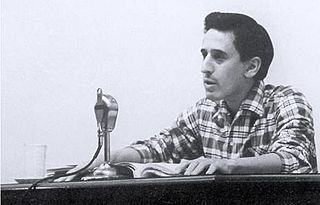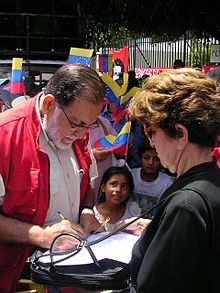
The Farabundo Martí National Liberation Front is one of the two major political parties in El Salvador.

The Chapultepec Peace Accords were a set of peace agreements signed on January 16, 1992, which brought an end to the Salvadoran Civil War. The treaty established peace between the Salvadoran government and the Farabundo Martí National Liberation Front (FMLN). It was signed in Chapultepec Castle, Mexico.

Presidential elections were held in El Salvador on 21 March 2004. Antonio Saca of the Nationalist Republican Alliance (ARENA) party won the election with 57% of the vote, avoiding the need for a run-off on 2 May.

The Nationalist Republican Alliance is a conservative, right-wing political party of El Salvador. It was founded on 30 September 1981 by retired Salvadoran Army Major Roberto D'Aubuisson. It defines itself as a political institution constituted to defend the democratic, republican, and representative system of government, the social market economy system and nationalism.

Elías Antonio "Tony" Saca González is a Salvadoran politician who was President of El Salvador from 1 June 2004 to 1 June 2009. He is currently serving a minimum 10 year prison sentence on corruption charges.

Agustín Farabundo Martí Rodríguez was a Marxist-Leninist activist and a revolutionary leader in El Salvador during La Matanza.

Roque Antonio Dalton García, born Roque Antonio García, better known as Roque Dalton, was a Salvadoran poet, essayist, journalist, communist activist, and intellectual. He is considered one of Latin America's most compelling poets. He wrote emotionally strong, sometimes sarcastic, and image-loaded works dealing with life, death, love, and politics.

The Communist Party of El Salvador was the official communist political party in El Salvador. The Communist Party was founded by Miguel Mármol on 10 March 1930.

Salvador Cayetano Carpio, aka Commander Marcial, was the leader of the Communist Party of El Salvador in the 1960s, until he quit the party to found the Salvadoran revolutionary political-military organization, the Fuerzas Populares de Liberación Farabundo Martí, also known by its initials, FPL) in 1970.

Legislative elections were held in El Salvador on 16 March 2003 to elect 84 deputies to the Legislative Assembly for a term of three years. The main opposition party, the Farabundo Martí National Liberation Front (FMLN), won the most seats in election at 31. However the governing Nationalist Republican Alliance (ARENA) won enough seats to continue in government with the Party of National Conciliation (PCN).

Óscar Samuel Ortiz Ascencio is a Salvadoran politician who served as the Vice President of El Salvador from 1 June 2014 to 1 June 2019. Previously he was the Mayor of Santa Tecla. He was first elected to that position in 2000, and he was re-elected in 2003, 2006, 2009 and 2012.

Elvia Violeta Menjívar Escalante is a Salvadoran politician affiliated with the Farabundo Martí National Liberation Front. She has been Minister of Health and Social Welfare since 1 June 2014. She is the former mayor of San Salvador.

Legislative elections were held in El Salvador on 18 January 2009. The leftist Farabundo Martí National Liberation Front (FMLN) was widely expected to win the most seats for the first time against the nationalist conservative Nationalist Republican Alliance (ARENA). As a result of the election, the Revolutionary Democratic Front, a left-wing party founded by FMLN dissidents in 2006 with the same name and symbols as the historic FDR from the Salvadoran Civil War, was deregistered as a political party as it failed to gain either a seat or 50,000 votes, as necessary to sustain registration. All parties contested the election in all departments, except for the FDR, which did not contest the election in three departments and stood jointly with the PDC in two others.

Salvador Sánchez Cerén is a Salvadoran politician who served as the 42nd President of El Salvador between 1 June 2014 and 1 June 2019. He took office on 1 June 2014, after winning the 2014 presidential election as the candidate of the left-wing Farabundo Martí National Liberation Front (FMLN). He previously served as Vice President under President Mauricio Funes from 2009 to 2014. He was also a guerrilla leader in the Civil War and is the first ex-rebel to serve as president.

Legislative and local elections were held in El Salvador on 11 March 2012 to choose 84 members of the legislative assembly and 262 mayors. The election was carried out by the Supreme Electoral Tribunal. The opposition Nationalist Republican Alliance (ARENA) narrowly defeated the Farabundo Martí National Liberation Front (FMLN) and its ally Grand Alliance for National Unity (GANA).

The People's Revolutionary Army was one of five leftist guerrilla organizations that comprised the Farabundo Martí National Liberation Front (FMLN). Formed on October 10, 1980, the FMLN was one of the main participants in the Salvadoran Civil War (1979-1992).
Palestinian Salvadorans are Salvadoran citizens of Palestinian descent or Palestine-born people residing in El Salvador. There are approximately 90,000 Salvadorans with Palestinian ancestry.
Mario Aguiñada Carranza was a Salvadoran activist and politician. He became politically active during his student years and joined the Communist Party of El Salvador. In the 1970s he became Secretary General of the Nationalist Democratic Union. During the Salvadoran Civil War he was on the side of the Farabundo Martí National Liberation Front and served as a diplomatic representative. Aguiñada Carranza was member of the Legislative Assembly of El Salvador between 1991 and 1994.

Medardo González Trejo is a Salvadoran politician. Since 2004 he is the Secretary General of the Farabundo Martí National Liberation Front (FMLN). He currently serves as a deputy in Legislative Assembly of El Salvador.
The final offensive of 1981, also known as the general offensive of 1981, was the unsuccessful first military offensive conducted by the Farabundo Martí National Liberation Front (FMLN) during the Salvadoran Civil War. The objective of the offensive was to initiate a popular revolution to overthrow the Revolutionary Government Junta, which had been ruling the country since the 1979 Salvadoran coup d'état. The FMLN hoped that the government would be overthrown by 20 January 1981, the date Ronald Reagan was to be inaugurated as president of the United States.















